Agriculture on Coral Atolls: Students from NCCU College of Social Sciences Conduct Field Internship in the Marshall Islands
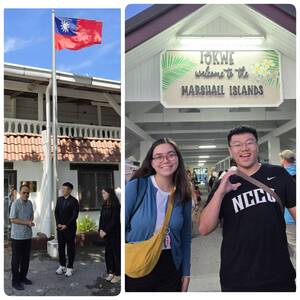
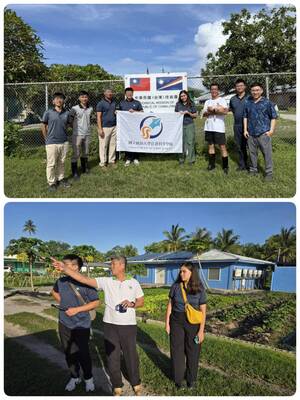
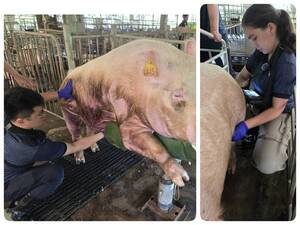
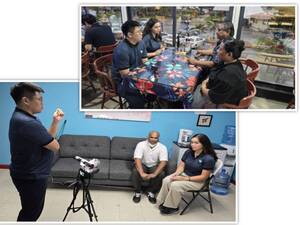
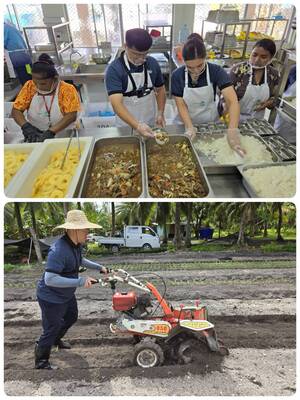
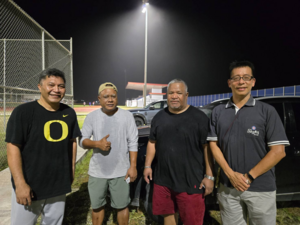
【Article by IMAS】
Dean Wan-Ying Yang of the College of Social Sciences (CSS) at National Chengchi University (NCCU) led the college in signing a cooperation agreement with the International Cooperation and Development Fund (TaiwanICDF) in May 2024. This initiative marked a major step toward combining academic training with international engagement. Shortly after the signing, the college dispatched student ambassadors to Eswatini for an initial observational visit. Upon their return, a press conference was held to promote greater awareness among faculty and students regarding Taiwan’s foreign aid efforts and to build stronger support within the academic community.
The 2025 internship program has since expanded to the Pacific region, with this year's fieldwork taking place in the Republic of the Marshall Islands in late August. Led by Associate Dean for International Affairs, Dr. Philip Hsiaopong Liu, the delegation included Catherine Tadlock, a student from the International Master’s Program in Asia-Pacific Studies (IMAS) and a U.S. national, alongside Yu-Ming Liu, a graduate student from the Graduate Institute of Development Studies.
Upon arrival in Marshall Islands, the two students were received by Minister Hank H.C. Liu of Taiwan’s Embassy. In his welcome remarks, Minister Liu encouraged the students to make full use of this rare opportunity to deepen their understanding of Taiwan’s contributions on the international stage. The students were then introduced to the Taiwan Technical Mission team, led by Chief Yu-Ming Lu, who guided them through a week-long field training program.
The first phase of the internship focused on swine husbandry. Pork remains a key source of protein in the Marshall Islands, yet both quantity and quality of production are in need of improvement. Over the years, TaiwanICDF has collaborated with local stakeholders to introduce improved pig breeds and advanced husbandry techniques. During their training, the interns were involved in every stage of the swine breeding process—from feeding, weighing, and breeding selection, to sperm collection and preservation, artificial insemination, pregnancy diagnosis, and assisted delivery. They also visited local farming households and engaged with residents to discuss their firsthand experiences in applying improved breeding techniques, gaining a deeper understanding of how technology transfer plays a vital role in supporting farmers' livelihoods.
Following their work with livestock, the students participated in a hands-on vegetable cultivation program. Due to the Marshall Islands’ coral atoll geography, arable land is extremely limited and the soil is poor in nutrients, making vegetable farming inherently difficult. This challenge is compounded by the widespread import of inexpensive processed foods, which has led to unbalanced diets and a growing prevalence of health issues among local residents.
In response, the TaiwanICDF has promoted vegetable varieties suited to the local environment and encouraged the use of pig manure compost to reduce costs while supporting environmental sustainability. More importantly, the project integrates nutrition education with a school lunch program. Through donations of kitchen equipment and regular vegetable supplies, some local schools are now able to provide nutritious meals.
In an interview, one principal noted that once students develop healthy eating habits, those habits continue to influence their families and communities even after graduation—gradually transforming the broader dietary culture.
Beyond agriculture, the TaiwanICDF’s efforts in the Marshall Islands also cover diverse areas such as education, environment, and vocational training. Two students observed Taiwanese teachers’ daily work in local classrooms and participated in a beach cleanup, witnessing firsthand the serious plastic pollution affecting the beautiful atoll. They also interviewed individuals who had received vocational training in Taiwan and returned home to find employment, learning how acquired skills help improve local livelihoods. These experiences gave the students a deeper understanding of international cooperation as a multifaceted endeavor, extending beyond agriculture and economics to encompass broader social development.
Although the field experience lasted only seven days, it provided rich and meaningful insights. Philip Hsiaopong Liu, CSS Associate Dean for International Affairs, noted that international cooperation is a cornerstone of Taiwan’s diplomatic efforts, spanning economic, educational, environmental, and social sectors—essentially covering all facets of social science research. Through NCCU’s CSS campus ambassador program, students gain direct exposure to Taiwan’s diplomatic practices and bring their experiences back to their universities, transforming them into valuable resources for outreach and education. This process helps expand the academic perspectives of their fellow students and fosters a new generation of globally engaged, proactive young scholars.
